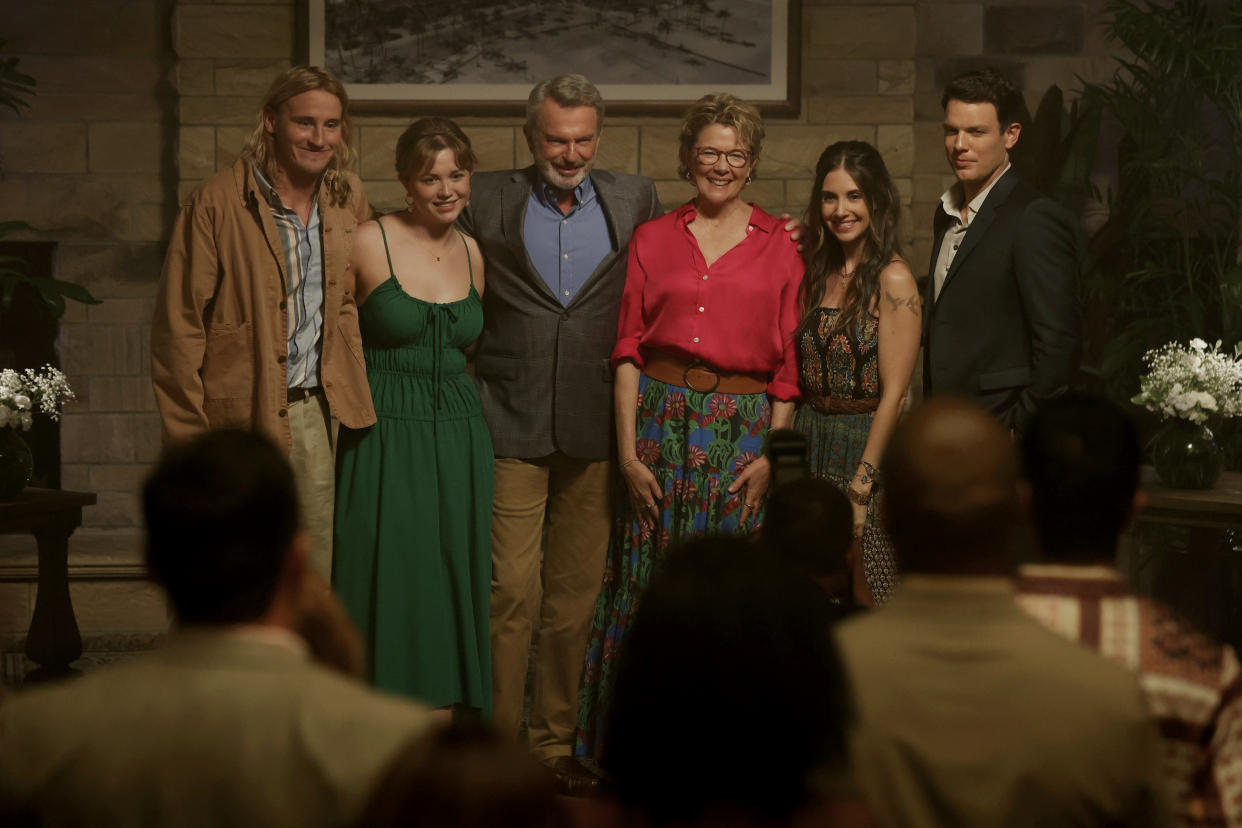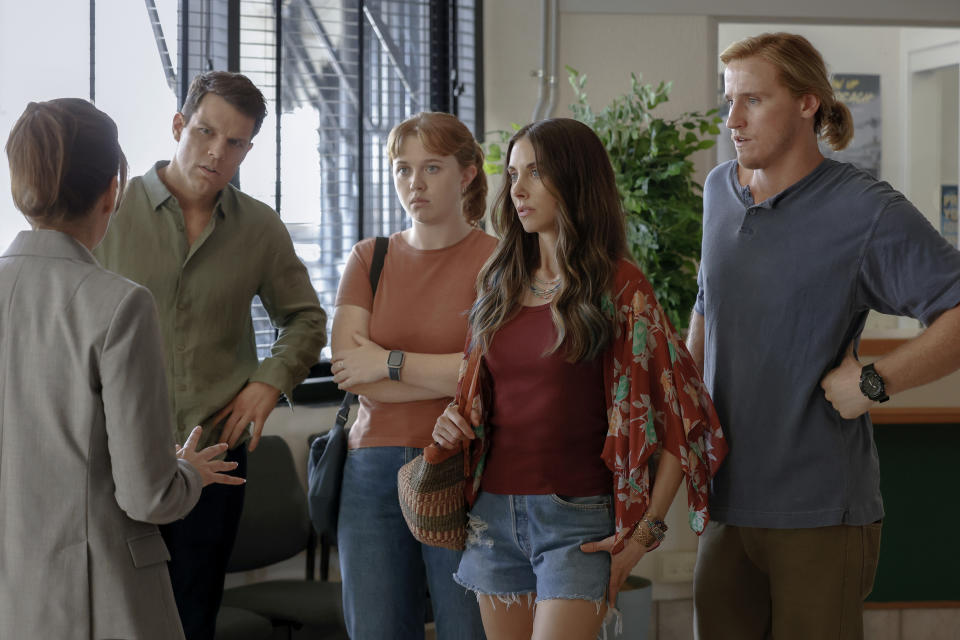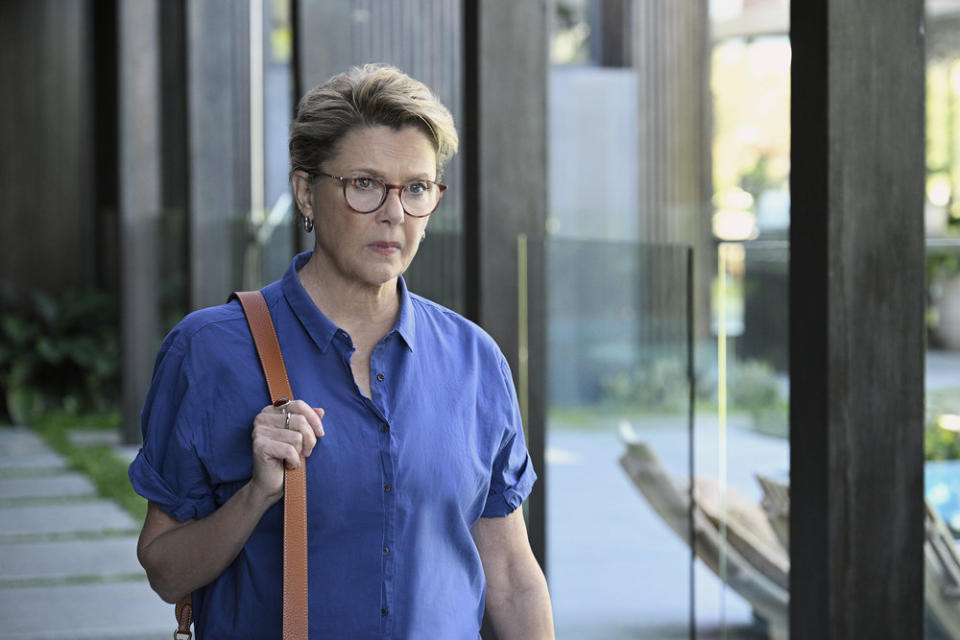How ‘Apples Never Fall’ Deconstructed a Twisted Family Jigsaw Puzzle, One Character at a Time

Structurally, it was a brilliant conceit having six of the seven episodes of the “Apples Never Fall” limited series (currently streaming on Peacock) revolve around a different family member in this twisted jigsaw puzzle of a mystery. Score one for showrunner Melanie Marnich, who had a lot of bitter-tasting family dynamics to work with in adapting Liane Moriarty’s (“Big Little Lies”) page-turner novel. It’s about the tennis-obsessed Delaneys, who unravel when matriarch Joy (Annette Bening) suddenly disappears and hot-tempered patriarch Stan (Sam Neill) becomes the prime suspect in what eventually becomes a murder investigation.
As a result, their four adult children — Troy (Jake Lacy), Amy (Alison Brie), Logan (Conor Merrigan-Turner), and Brooke (Essie Randles) — are forced to confront their dysfunctional upbringing, competitive natures, and toxic relationships in realizing that they function more like a South Florida cult than a loving family.
More from IndieWire
For editor Jacquelyn Le, focusing each episode on a different Delancey was a great way to deconstruct the noirish mystery bathed in sunlight about Joy’s disappearance. Split between “then” and “now” timelines, it’s a clever back-and-forth volley. Le cut episodes 2 (“Logan”), 5 (“Troy”), and 7 (“Joy”), the finale.
“Melanie did a great job of basically starting every episode with a scene that would be that character’s episode,” Le told IndieWire. “So, while we are changing the main character of every episode, we do start solidly, like, anchoring ourselves in the perspective of that one family member. We tried to be very intentional while still concealing whatever we could.”

Contrasting the two brothers in their respective episodes became Le’s primary focus: The younger Logan, who’s passive and non-confrontational, is close to his dad and defends him like a lapdog. Ironically, as manager of the marina, he discovers the incriminating video evidence against his dad. Troy, a wealthy venture capitalist, resents his dad since childhood and is the first to suspect he’s behind his mom’s disappearance.
“For me, immediately, I wanted to make sure we were hearing the sounds — for example, Logan in [Episode] 2 — when he starts [scuba diving] underwater,” Le said. “I wanted our soundscape to be very similar to what he’s hearing and what he’s experiencing so that, early on, we could anchor each story in each episode in that character’s story in their space. A lot of times, the fun thing about it was that each family member is a different part of this puzzle, and their own past and histories and motivations and actions all play a little part in what comes to fruition at the end.”
The brothers’ contrasting personalities even carried over into the needle drops. They reflect Logan’s worst fears about his dad (“Are You All Good?” by breathe) and Troy’s constant anger (“Cruel World” by Phantogram). “It’s a dark, electric vibe [for Logan],” Le said, “where it’s also sort of depressed as [he’s] realizing that his father may not be as truthful as he thought. And ‘Cruel World’ is hip and aggressive and it really feels like worlds are colliding and falling apart. It’s also something I could see Troy listening to.”
Troy’s episode begins with a series of painful flashbacks as he wakes up and trains to get ready for his day. It’s a daily motivational routine: As a teenager, Troy gets into a fight with rival tennis player Harry (Giles Matthhey) after he catches him cheating. But his dad sides with Harry, his prodigy, and slaps Troy. “Originally, the flashbacks were very long memories, and they were pretty lengthy,” said Le. “And when I first cut that, I already knew this is too brutal, like we’re in the past too long. We talked about it at every stage and shortened it, but kept it pretty linear. It was about distilling the essential beats of that memory and intercutting them much more chaotically with his morning.”

Later in the episode, another painful flashback reveals a dark secret that Joy has kept as the family watches tennis in the living room. Cutting this was like attacking a microcosm of the series. “There’s a number of things that are really great about it,” Le said. “One is that we have such an ensemble piece and everybody’s motivations are so different and so distinct that the fight is so organically interesting. They all have their defenses down, and everybody is floating around this room.
“Part of that is the blocking, the directing [Dawn Shadforth], the writing [Joe Hortua],” she continued, “and the actors are all just very good at working around each other and letting each other have that space to really go there. They all have a point of view, especially at this moment that is so defining for their family. And it was just so wonderful to try and piece all these things together. There are so many secrets, and you have these reactions where we don’t need to say anything.”
Yet Joy is the centerpiece of this pivotal scene, and Bening displays a full range of emotions as the strong, protective matriarch. “Annette was such a dream to cut,” the editor said. “She is the perfect embodiment for this role because she is so full of life and joyous. But this was a huge moment, and every take [with her] was wonderful, and they were all different.
“Sometimes Annette was very stoic, sometimes she was very emotional, sometimes she was very intense, and just like kind of screaming the line out,” Le continued. “And they were all really good. And now what we’ve got to do is kind of look at the arc of it, and what’s the best way to get her from point A to point C, and where the moment is where she should really launch off.”
Best of IndieWire
Sign up for Indiewire's Newsletter. For the latest news, follow us on Facebook, Twitter, and Instagram.

 Yahoo News
Yahoo News 
